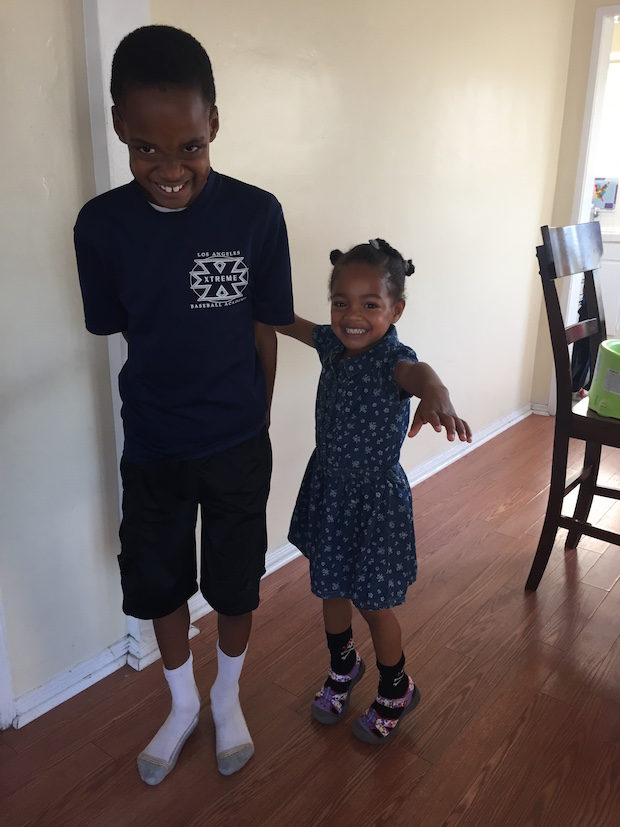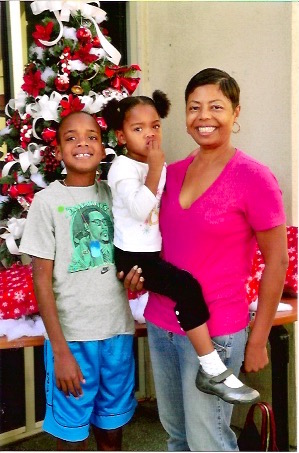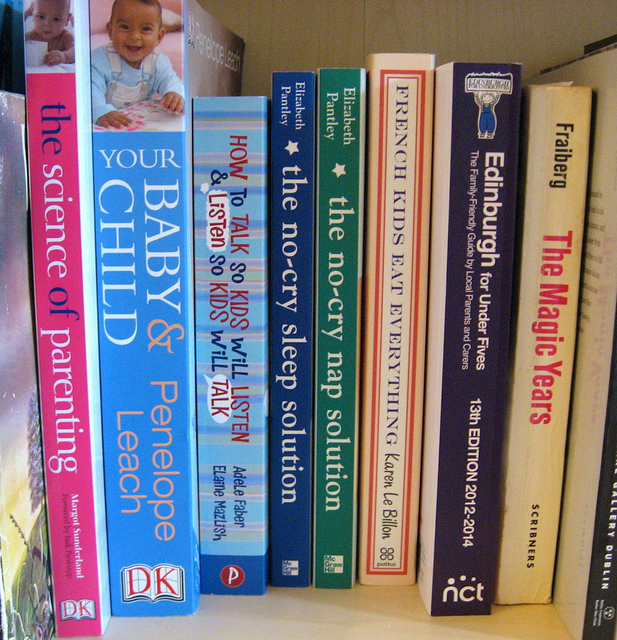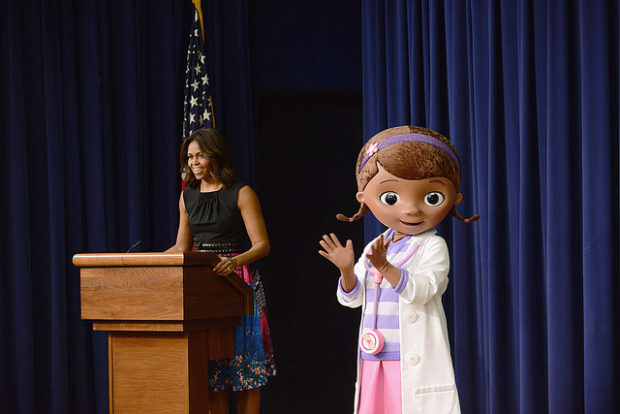Nefertiti Austin on Adoption’s #PARENTINGSOWHITE Problem
I’ve become fast friends with a parent at my son’s school. Recently she admitted that she thought my husband had left me and my kids, and that if she saw him in the street, she would beat him down. While I laughed out loud, I realized that at first glance, I am a stereotype: single Black mother of two children with different daddies. Upon inquiry, you’ll learn, as she did, that I am a single adoptive mother of half-siblings from the foster care system. Though Black single motherhood is closely identified with miscreant boys, teen pregnancy, and sports icons like LeBron James, Black single adoptive motherhood seems to happen in a vacuum. Unless we’re as popular as Shonda Rhimes and own Thursday night on a popular network, single Black adoptive moms like me are not mainstream enough to be discussed around the water cooler. We are simply not seen. I thought I could change that by writing a memoir about my underexplored approach to parenting, but a year’s worth of rejection letters say otherwise.

This missive is about the difficulty of selling my story to the publishing industry that makes millions from books about motherhood—but insists that Black mom narratives are too marginal to sell. I am hardly the first to make this observation. Eight years ago, Deesha Philyaw examined this issue in “Ain’t I A Mommy, Why Are So Few Motherhood Memoirs Penned by Women of Color?” In it, Philyaw examines the cult of true womanhood and its emphasis on the delicate white woman whose place was in the home. This cult did not include all women because Black women’s children were often sold off, freeing Black women to work and mother other people’s kids. Fast forward four centuries and the mommy pedestal remains beyond the grasp of Black women who are still primarily working mothers. As for Black stay-at-home moms, Philyaw writes of their generational struggle with exercising this privilege knowing their foremothers were denied this opportunity, because of their race. Ain’t I A Mommy also addresses the media generated “mommy wars” and other narratives about first world parenting problems like carrying the right Birkin bag to carpool that have little relevance to the lives of Black mothers. Presumably these types of memoirs represent the industry standard and have glutted the market, leaving no room for alternate voices about parenting. I can’t help but echo Philyaw’s eight year old question: “[d]id they presume that a minority of middle-class and upper-middle-class married white women could speak for all mothers?”
Stories about mother and child are universal. Songs have been sung about this special bond; movies produced to celebrate this connection; and many popular books have been published to honor women who raise boys to men. This love has no color lines and Black women writing in the parenting genre are only writing what we know to be true, just like the French mom, the slacker mom and the shitty mom. These narratives reveal a myriad of child-rearing practices, release women from the pressure of having to be super mom (well except that Tiger Mom) and encourage women to practice self-care without guilt. We experience those same struggles and insecurities and unless you’ve had the good fortune to read Ylonda Gault Caviness’ Child Please: How Mama’s Old-School Lessons Helped Me Check Myself Before I Wrecked Myself, who deftly writes of her parenting highs and lows, no one knows about them. For the literati have determined that our stories are too niche; the market too small. Translation: non-white parenting perspectives do not matter.

But our parenting experiences do matter. In fact, I kept hearing from agents regarding my memoir that this was “important” work–just not enough for them to represent and sell it. I’m not trying to be important. I waded into nonfiction because I adopted a beautiful baby boy who looked like me and could not find one parenting book with an anecdote about a Black woman who successfully adopted and raised a Black boy solo. Nor did I see other adoptive mothers who changed their child’s birth name out of economic necessity. “Are Emily and Greg More Employable than Lakisha and Jamal? A Field Experiment on Labor Market Discrimination” for the National Bureau of Economic Research (NBER Working Paper No. 9873) written by Marianne Bertrand and Sendhil Mullainathan prove that resumes with names that are too ethnic get tossed or shuffled to the bottom of the pile. While Black people know the name Darqueesha (pronounced där key sha) pays homage to Darren and Kisha, white employers do not. Adoption trainers admonish prospective parents that changing a child’s name will rob him of his identity. Whether or not that is true, some Black adoptive parents believe that a name should offer a trajectory beyond the da’ hood, the court or the gridiron. This type of insight is not available in the Handbook for Single Adoptive Parents (Marindin) or Adopting On Your Own: The Complete Guide to Adoption for Single Parents (Varon). Both offer great advice on navigating the adoption process, choosing the right agency, interracial adoption and LGBTQ adoption, but do not address cultural nuances specific to Black adoption.
Another aspect of Black Adoption that is missing from mainstream publications is informal parenting arrangements geared to keep loved ones out of the system. Family elders are given the task of deciding who will parent the grandbaby, niece, nephew or cousin who needs a home. Involving the court is unnecessary, as everyone abides by the decision. This is how it went down in my family and how my brother and I came to live with our grandparents. But this example of Black adoption and memoirs about Black single adoptive motherhood are all but non-existent. The one recent exception is Caroline Clarke’s Postcards from Cookie: A Memoir of Motherhood, Miracles and a Whole Lot of Mail. Ms. Clarke is Nat King Cole’s granddaughter and niece of the late Natalie Cole. She was adopted as an infant by a Black couple and raised in New York. Ms. Clarke’s memoir explores how an illness compelled her to seek the identity of her birth parents.

Publishers should be paying attention to this untapped demographic, instead they’re complicit in upholding the white mommy memoir status quo. It’s like #OscarsSoWhite but in adoption, #ParentingSoWhite. So, I’m calling on literary gatekeepers to broaden the parenting canon and stop sending beautiful rejection letters gently explaining: “though you are a great writer, it’s going to be a fight” or “your focus on Black adoption is interesting but too narrow.” Too narrow for whom? Even Disney, which is typically behind the diversity curve, introduced a Black adoption story line in über popular Doc McStuffins.
Finally, where are the feminists in publishing who understood the need for Warmth of Other Suns (Wilkerson), a tome about Black migration in America, which incidentally had a huge impact on what adoption means to Black people, but are unable to imagine how the Black adoption experience fits in the discussion about parenting in the 21st century? Diverse narratives add to everyone’s cultural competency, and the larger discourse on parenting. For not only is my story relevant to other mothers “like me” who are looking to learn about adoption, it offers a greater appreciation for all paths to parenthood, regardless of race. If editors want to stop yawning into their afternoon coffee having received yet another memoir about an upper-middle-class white mom who secretly reads porn, task agents with finding books by and about mothers of color. Our lens may be informed by historiography, race and gender but we are still writing about motherhood. And what is more universal than having a mother?









7 Responses to Nefertiti Austin on Adoption’s #PARENTINGSOWHITE Problem